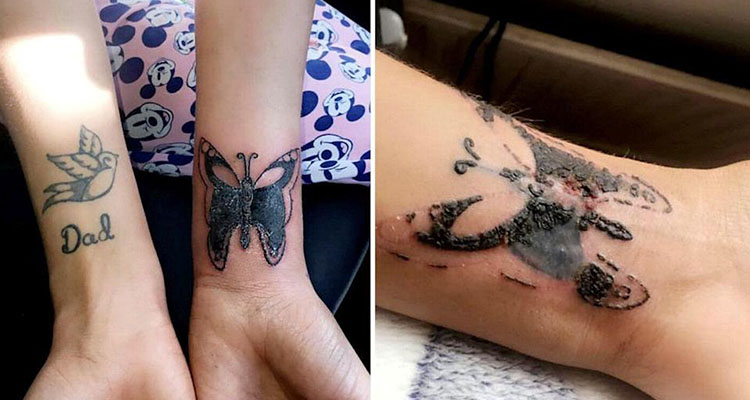Contents
Tattoo Infection: Tips for Treatment and Identification

The idea of getting an infected tattoo might not even come across your mind when you go to your tattoo consultation and book your day of getting inked.
In fact, if you don’t work with a trusted tattoo artist or you don’t maintain your tattoo afterwards then it is possible to get a tattoo infection. In this guide, we’ll show you some of the keys to tattoo aftercare, and how to treat an infected tattoo if you get there.
How do you know if your tattoo is infected?
It’s vital that you know the signs of an infected tattoo to make sure you can get treatment quickly if you need to, and approach your tattoo aftercare easily.
⇒ Signs of an infected tattoo
Having an infection in your ink can make you feel terrible. You may be wondering “what does an infected tattoo look like?”
You can usually tell that the tattoo is infected by the way it looks , with lots of redness, lesions, and even pus coming out. Though all tattoos tend to have a bit of redness and swelling, signs of infected tattoos can be extreme, and even cause other levels of physical pain and discomfort.
For example, it’s possible that you will have a fever as your body reacts, and that you keep going hot and cold in stages.
⇒ Infected tattoo stages
The stages can vary depending on when you get the infection . It will usually get very itchy, to the point of serious discomfort. It will then start to go very red and the pus will develop. That’s when the shivers and fever can kick in. The infected tattoo stages can vary from one person to another, but it should be clear when you need to get it checked out.
How do you treat an infected tattoo and how long does it take?
An infected tattoo can take weeks to heal properly. They can also run the risk of scarring. The treatment can usually be done at home and takes just a few weeks, but sometimes it can require long-term treatment. Bumps and rashes just need daily cleaning, and an antibacterial ointment, proper tattoo aftercare comes into play here.
More serious infections that spread may need a course of antibiotics and clean up in a longer period of time.
⇒ When to see a doctor?
If you develop a fever then you should see your doctor. On top of this, if there is pus, and you feel like there is any sort of serious infection in the area it just is not worth taking any sort of risk. Instead, go to a doctor and let them know you have recently been tattooed and fear an infection could be spreading.
In extreme cases, infection, even of a small tattoo, can be life-threatening, so it isn’t worth taking any risks.
⇒ Good aftercare routine
A good tattoo aftercare routine is essential. This means wrapping the tattoo for the first days after it is carried out, and following your tattoo artist’s advice on aftercare and treatment.
You need to wash the area regularly with antimicrobial soap and water and pat the area to dry. Do not rub it. You can also find tattoo ointments that you can apply twice a day, these should be antibacterial to stop the infection.
How to prevent tattoo infection?
What are some ways to prevent your tattoo getting infected? You won’t need to know how to treat an infected tattoo if you can prevent it from ever happening.
Getting the tattoo wrapped is one of the key ways to stop it in the first few days. You should also use antibacterial aftercare products to make sure any bacteria that could be the cause of an infection are quickly wiped out and killed. Taking your aftercare routine seriously is so important. Some people think their body will heal without it, but you are running the risk.
⇒ Make sure you get tattooed by a licensed artist
Licensed parlors and tattoo artists get regular inspections, and the state they are in will have health agencies that can close them down if they don’t ensure they are a safe and sterile environment. An unlicensed artist should always be avoided, and there are plenty out there. Make sure you check before you agree to be inked, and go to your tattoo consultation to check that the place seems to be clean and well-run.
FAQs:
1. Can an infected tattoo heal on its own?
It’s very unlikely that a tattoo will heal on its own if it gets an infection, and the very least you will need to do is to clean it. In many cases, you will need a doctor to give you antibiotics to treat the infection and make sure it doesn’t spread and threaten your whole system.
2. How long after a tattoo can it get infected?
A tattoo generally will get infected two or three weeks after you have been inked, but it can vary. After three or four weeks the risk will reduce, but not totally disappear, and the tattoo might actually get infected within a few short days of being carried out.
3. Will a tattoo infection ruin the tattoo?
Most infections don’t completely ruin the tattoo. If you get an extreme level of infection or leave it untreated it is very likely that the tattoo will be ruined. This is why it is so important that you quickly get your infection treated and keep a close eye on the tattoo in the days and weeks after the tattoo is completed.
4. How do you take care of a tattoo at home?
The main steps of taking care of a tattoo at home are covering it in the early stages, applying an antibacterial ointment twice a day, and using a moisturizer to keep the tattoo from feeling too dry and itchy. You also need to closely monitor the tattoo so if it does show signs of being infected you can quickly get the help you need.
